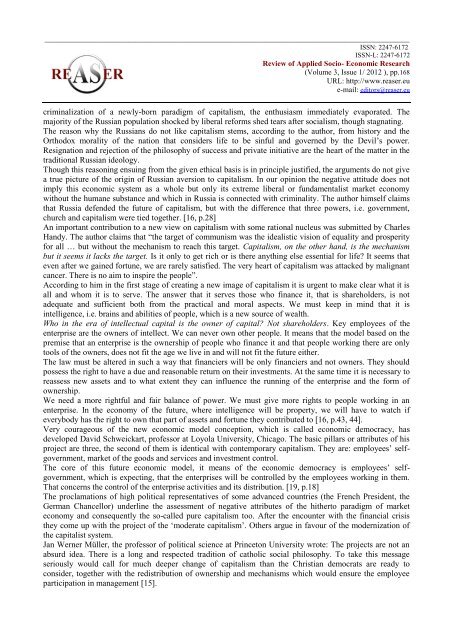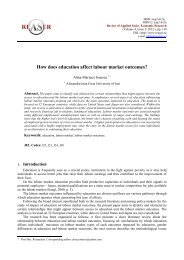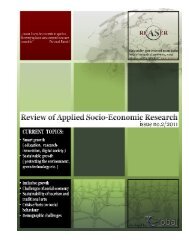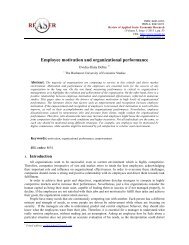Volume 3, ISSUE1/2012 - Review of Applied Socio-Economic ...
Volume 3, ISSUE1/2012 - Review of Applied Socio-Economic ...
Volume 3, ISSUE1/2012 - Review of Applied Socio-Economic ...
You also want an ePaper? Increase the reach of your titles
YUMPU automatically turns print PDFs into web optimized ePapers that Google loves.
________________________________________________________________________________________________<br />
ISSN: 2247-6172<br />
ISSN-L: 2247-6172<br />
<strong>Review</strong> <strong>of</strong> <strong>Applied</strong> <strong>Socio</strong>- <strong>Economic</strong> Research<br />
(<strong>Volume</strong> 3, Issue 1/ <strong>2012</strong> ), pp.168<br />
URL: http://www.reaser.eu<br />
e-mail: editors@reaser.eu<br />
criminalization <strong>of</strong> a newly-born paradigm <strong>of</strong> capitalism, the enthusiasm immediately evaporated. The<br />
majority <strong>of</strong> the Russian population shocked by liberal reforms shed tears after socialism, though stagnating.<br />
The reason why the Russians do not like capitalism stems, according to the author, from history and the<br />
Orthodox morality <strong>of</strong> the nation that considers life to be sinful and governed by the Devil’s power.<br />
Resignation and rejection <strong>of</strong> the philosophy <strong>of</strong> success and private initiative are the heart <strong>of</strong> the matter in the<br />
traditional Russian ideology.<br />
Though this reasoning ensuing from the given ethical basis is in principle justified, the arguments do not give<br />
a true picture <strong>of</strong> the origin <strong>of</strong> Russian aversion to capitalism. In our opinion the negative attitude does not<br />
imply this economic system as a whole but only its extreme liberal or fundamentalist market economy<br />
without the humane substance and which in Russia is connected with criminality. The author himself claims<br />
that Russia defended the future <strong>of</strong> capitalism, but with the difference that three powers, i.e. government,<br />
church and capitalism were tied together. [16, p.28]<br />
An important contribution to a new view on capitalism with some rational nucleus was submitted by Charles<br />
Handy. The author claims that “the target <strong>of</strong> communism was the idealistic vision <strong>of</strong> equality and prosperity<br />
for all … but without the mechanism to reach this target. Capitalism, on the other hand, is the mechanism<br />
but it seems it lacks the target. Is it only to get rich or is there anything else essential for life? It seems that<br />
even after we gained fortune, we are rarely satisfied. The very heart <strong>of</strong> capitalism was attacked by malignant<br />
cancer. There is no aim to inspire the people”.<br />
According to him in the first stage <strong>of</strong> creating a new image <strong>of</strong> capitalism it is urgent to make clear what it is<br />
all and whom it is to serve. The answer that it serves those who finance it, that is shareholders, is not<br />
adequate and sufficient both from the practical and moral aspects. We must keep in mind that it is<br />
intelligence, i.e. brains and abilities <strong>of</strong> people, which is a new source <strong>of</strong> wealth.<br />
Who in the era <strong>of</strong> intellectual capital is the owner <strong>of</strong> capital? Not shareholders. Key employees <strong>of</strong> the<br />
enterprise are the owners <strong>of</strong> intellect. We can never own other people. It means that the model based on the<br />
premise that an enterprise is the ownership <strong>of</strong> people who finance it and that people working there are only<br />
tools <strong>of</strong> the owners, does not fit the age we live in and will not fit the future either.<br />
The law must be altered in such a way that financiers will be only financiers and not owners. They should<br />
possess the right to have a due and reasonable return on their investments. At the same time it is necessary to<br />
reassess new assets and to what extent they can influence the running <strong>of</strong> the enterprise and the form <strong>of</strong><br />
ownership.<br />
We need a more rightful and fair balance <strong>of</strong> power. We must give more rights to people working in an<br />
enterprise. In the economy <strong>of</strong> the future, where intelligence will be property, we will have to watch if<br />
everybody has the right to own that part <strong>of</strong> assets and fortune they contributed to [16, p.43, 44].<br />
Very courageous <strong>of</strong> the new economic model conception, which is called economic democracy, has<br />
developed David Schweickart, pr<strong>of</strong>essor at Loyola University, Chicago. The basic pillars or attributes <strong>of</strong> his<br />
project are three, the second <strong>of</strong> them is identical with contemporary capitalism. They are: employees’ selfgovernment,<br />
market <strong>of</strong> the goods and services and investment control.<br />
The core <strong>of</strong> this future economic model, it means <strong>of</strong> the economic democracy is employees’ selfgovernment,<br />
which is expecting, that the enterprises will be controlled by the employees working in them.<br />
That concerns the control <strong>of</strong> the enterprise activities and its distribution. [19, p.18]<br />
The proclamations <strong>of</strong> high political representatives <strong>of</strong> some advanced countries (the French President, the<br />
German Chancellor) underline the assessment <strong>of</strong> negative attributes <strong>of</strong> the hitherto paradigm <strong>of</strong> market<br />
economy and consequently the so-called pure capitalism too. After the encounter with the financial crisis<br />
they come up with the project <strong>of</strong> the ‘moderate capitalism’. Others argue in favour <strong>of</strong> the modernization <strong>of</strong><br />
the capitalist system.<br />
Jan Werner Müller, the pr<strong>of</strong>essor <strong>of</strong> political science at Princeton University wrote: The projects are not an<br />
absurd idea. There is a long and respected tradition <strong>of</strong> catholic social philosophy. To take this message<br />
seriously would call for much deeper change <strong>of</strong> capitalism than the Christian democrats are ready to<br />
consider, together with the redistribution <strong>of</strong> ownership and mechanisms which would ensure the employee<br />
participation in management [15].








